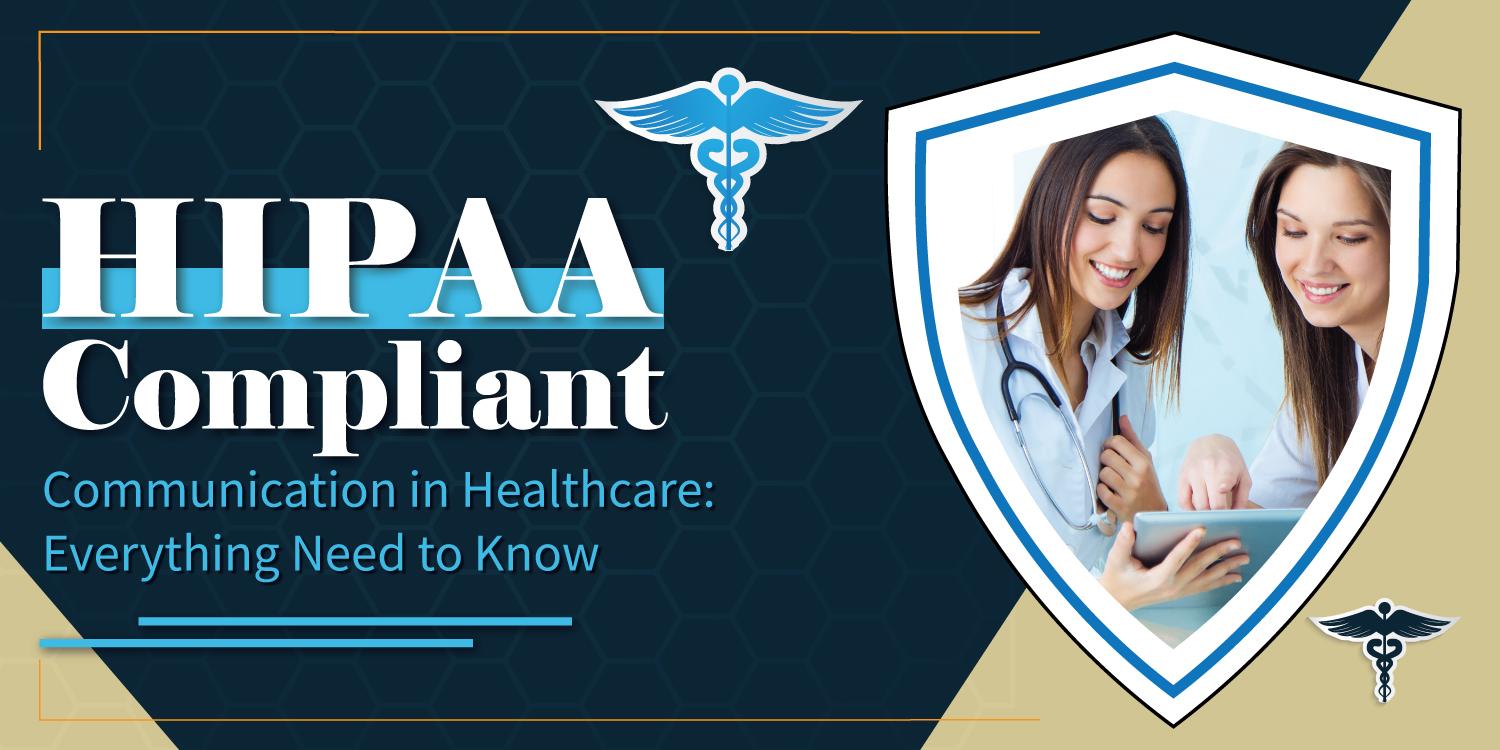HIPAA Compliant Communication in Healthcare: Everything Need to Know
Communication in Healthcare has been improved greatly with the long-lasting impacts of COVID-19. During that period, we have seen the creation and adoption of different communication methods and alternatives in the healthcare industry. An HHS study from December 2021 also advocates the same. It showcases the increased usage of telehealth among medicare patients. From 840000 patients in 2019 to 52.7 million in 2020, the Medicare patients count increased by 63 percent.
It does matter what methods are being used for communication in Healthcare. Whether they are telehealth, texting, cloud-based VoIP or email, or others, they must adhere to HIPAA guidelines and regulations as HIPAA compliance is mandatory.
Before delving deep into HIPAA-compliant communication in Healthcare, it is necessary to know about HIPAA, its compliance in healthcare communication, and its benefits first.
Definition of HIPAA
HIPAA or the Health Insurance Portability and Accountability Act, is a government act that protects patient privacy. It was created to keep patient data safe and ensure that businesses stay protected against powerful lawsuits capable of destroying their operations. Not only does it protect your healthcare organization, but also your patients and employees as well.
Becoming HIPAA compliant
The United States Department of Health and Human Services (HHS) published two regulations- HIPAA Privacy Rule and HIPAA Security Rule to define the regulations protecting patients’ private data.
The Privacy Rule can be understood as the national standard for the protection of health information. Whereas the Security Rule refers to the national standards to safeguard the storage and the transferring of health information in an electronic form.
Healthcare organizations and associated entities can become HIPAA compliant just by implementing any HIPAA regulations to ensure the privacy, confidentiality, and availability of any PHI.
A healthcare organization or any other covered entity can disclose protected health information of an individual without his consent only for the purposes or situations like
- Treatment, payment, and healthcare operations
- When it is necessary according to law
- Victims of abuse or domestic violence
- Functions concerning a deceased individual
- Public health activities
- Workers compensation
- Preventing or lowering a serious threat to health or safety
Want to Develop HIPAA Compliant Telemedicine Application with Advanced Features?
Request a QuoteBenefits of HIPAA Compliance Communication in Healthcare
Being HIPAA compliant app will benefit your business if you are a covered entity, business associate, or managed service provider. It will benefit your business to provide HIPAA-compliant communications in the following ways like
- Providing protection against PHI loss
- Increased awareness of patient well-being
- Development of patient safety culture
- Improved satisfaction scores from families and patients alike
- liability reduction for your organization and executives
Now, all the important terminologies and aspects associated with HIPAA have been discussed. It’s time to get back to understanding communication in Healthcare in detail.
HIPAA-Compliant Communication in Healthcare: Covered Entities vs. Business Associates
The HIPAA regulations categorize healthcare businesses into two groups depending on how they manage protected health information (PHI).
- Covered Entities (CE)
- Business Associates (BA)
Covered Entities (CE):
Entities like healthcare providers, health insurers, and health data clearinghouses fall into this category. They utilize PHI for activities like treatment, billing, and data analysis to support the prior ones. At the same time, the covered entities like doctors and insurance companies create PHI as a part of their normal activities.
Business Associates (BA):
A company with PHI to offer support services to CEs or other BAs is known as a business associate. Electronic health records services, third-party billers, and print/mailing firms that send statements to patients are some of the best examples of BAs.
It is a must for the BAs to comply with the HIPAA’s Privacy Rule, Security Rule, and the HITECH Omnibus Rule, including breach notification and PHI protection in physical or electronic (ePHI) formats.
Whenever a PHI exchange takes place between organizations, they must sign Business Associate Agreements (BAAs) because it ensures an unbroken chain of telehealth HIPAA compliant in any place where PHI is stored and used.
HIPAA-Compliant Communication in Healthcare: Adherence to Set of Rules
Whether you’re a CE or a BA, the HIPAA-compliant communications norms are something very similar. Each organization should address four vital regions assuming they contact ePHI. The BAs that help your interchanges needs should have a similar obligation to consistency.
Regulatory
BAs giving correspondence administrations should carry out security the board cycles and methodology to forestall, distinguish, contain and address security infringement of ePHI information. They should have a distinguished security official and ePHI access to the executives’ methodology. BAs should likewise have to progress security mindfulness preparing, episode and alternate courses of action, and occasional security assessments.
Physical
Communication administration BAs should carry out actual access control to all areas lodging ePHI information as well as any endpoint gadgets (workstations, cell phones, IP telephones) that entrance any ePHI information.
Specialized
BAs in the correspondence administration industry should execute access control components to control admittance to ePHI information. Client validation, access logging, and reviewing of ePHI information access are additionally required. At long last, transmission security for any ePHI information sent to and from the cloud HIPAA compliance should be given.
Hierarchical
Communication administration BAs should carry out any extra arrangements and methods to guarantee consistency with all HIPAA security rules. All security documentation ought to be in a composed/electronic structure.
HIPAA Compliant Communication in Healthcare: The Essentials
As referenced before, the objective while going into BAAs with any association that upholds your organization is to make a solid chain of HIPAA consistency that gives the best security and security insurance for patient PHI and ePHI.
What does that resemble while assessing medical care interchanges merchants or any seller giving information administrations and backing? While every circumstance might require explicit use arrangements, there are a few general things you ought to search for:
Multifaceted Authentication (MFA) on ALL gadgets – MFA ought to be available on any work areas, PCs, cell phones, or different gadgets that can get to, send, or store ePHI.
Full encryption on the way and very still – All satisfied and correspondences communicated should be completely scrambled both on the way (default RC4-128 encryption) and very still (256-bit AES encryption) inside the server farms.
Downstream BAA consistence – All merchants ought to be completely HIPAA agreeable and have gotten BAAs with downstream subcontractors and outsider sellers.
Start to finish HIPAA Compliance – All three parts, the correspondences specialist organization (and any related server farm), the availability circuit, and the endpoint gadgets (where ePHI is gotten to) should be HIPAA/HITECH compliant for the information sent to be completely agreeable and secure.
Proactive Security and Recovery Solutions – The correspondence specialist co-op ought to utilize the most recent HIPAA agreeable physical and digital protection innovation. They ought to likewise refresh programming and frameworks on a case-by-case basis, screen for new dangers like infections and malware, lead infiltration testing on their frameworks to distinguish conceivable passage focuses for cyberattacks, and have strong recovery plans to get your administrations reestablished as fast and safely as could really be expected.
Conclusion:
Going through this blog, you may have understood HIPAA compliance in healthcare communication, and more to keep patients’ data safe and secure while dealing with their ailments. Every healthcare organization that deals with patient data electronically in the healthcare ecosystem should comply with HIPAA as mandatory. It reduces the threat of data breaches and builds confidence among the patients that their information is safe and secure.
VCDoctor-HIPAA-compliant telemedicine software is one such platform that guarantees the safest communication in healthcare. It provides different sorts of communication, and ease, from HIPAA Compliant video conferencing with the patients to chat options with the clinical coordinators and more. It simply streamlines your clinical workflow and operations and paves your healthcare business toward success.
Here at VCDoctor, we have a range of solutions strictly dedicated to the type of your healthcare business. You can choose from
- Telemedicine Solution for Patient
- Telemedicine Solution for Provider
- Telemedicine Solution for Clinic
- Telemedicine Solution for Startups
And smoothen communication in healthcare that is HIPAA compliant. For more information about VCDoctor, visit our website or book a free demo of our telemedicine software.




